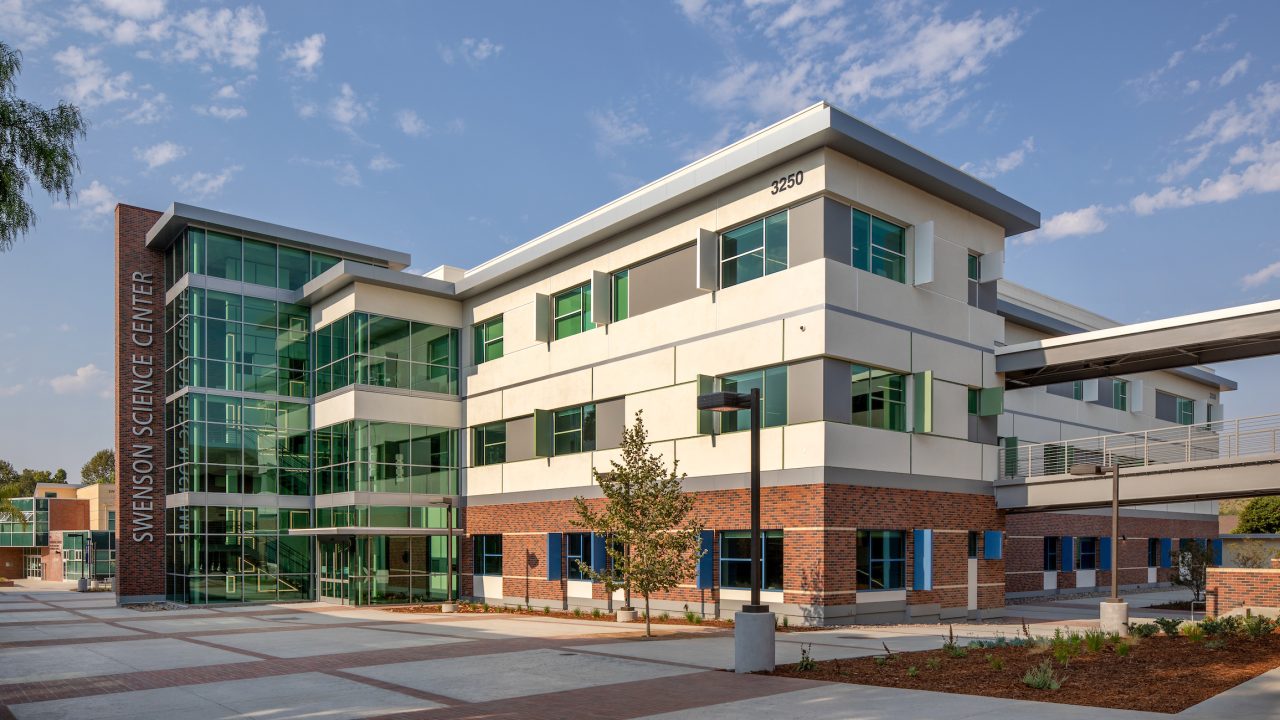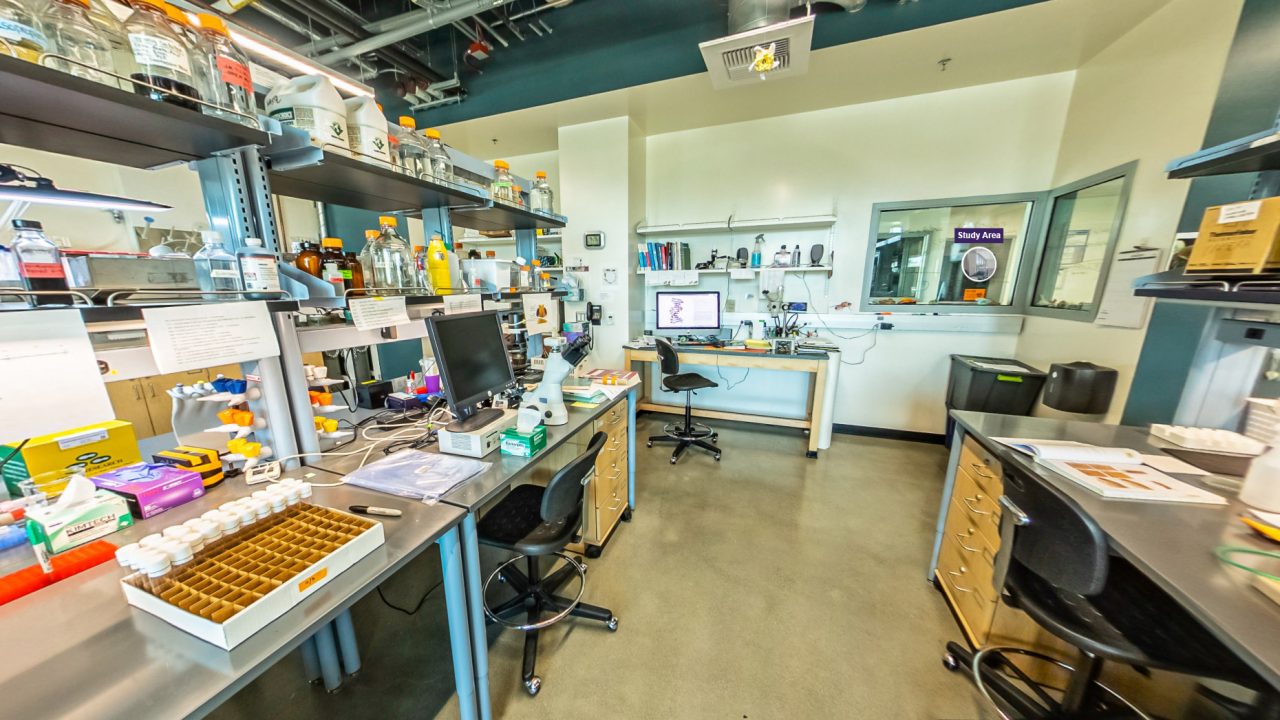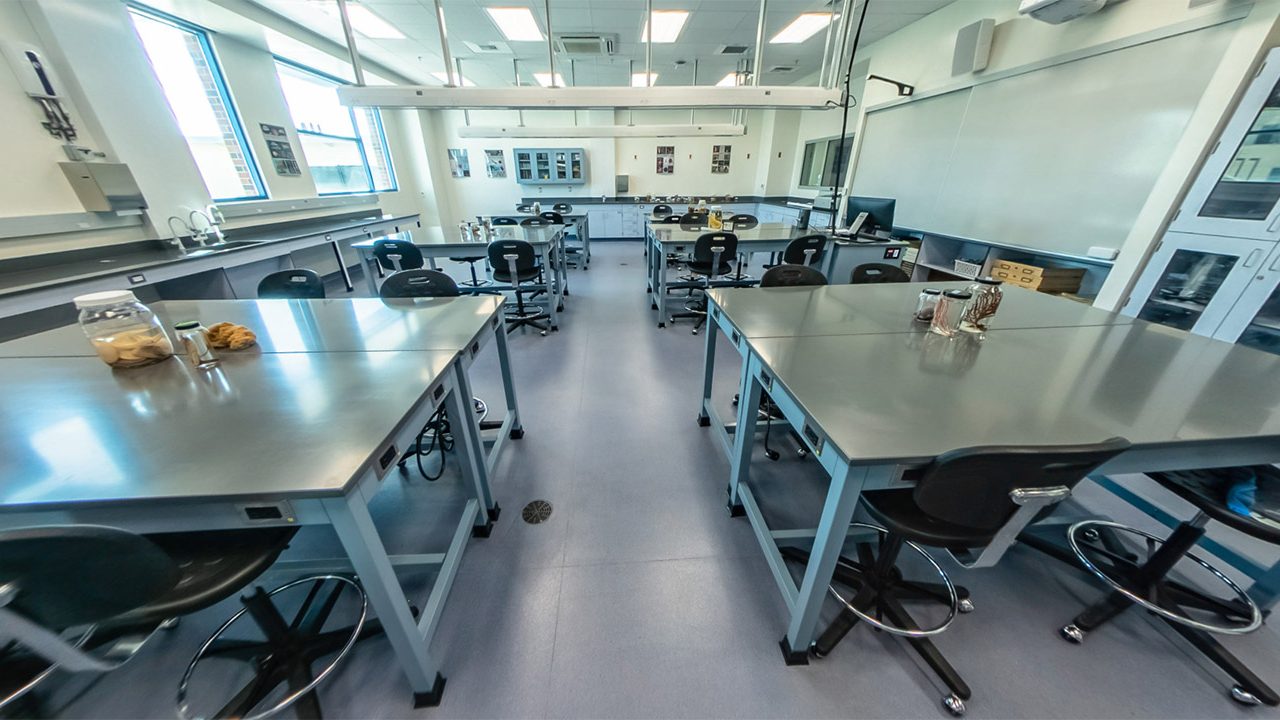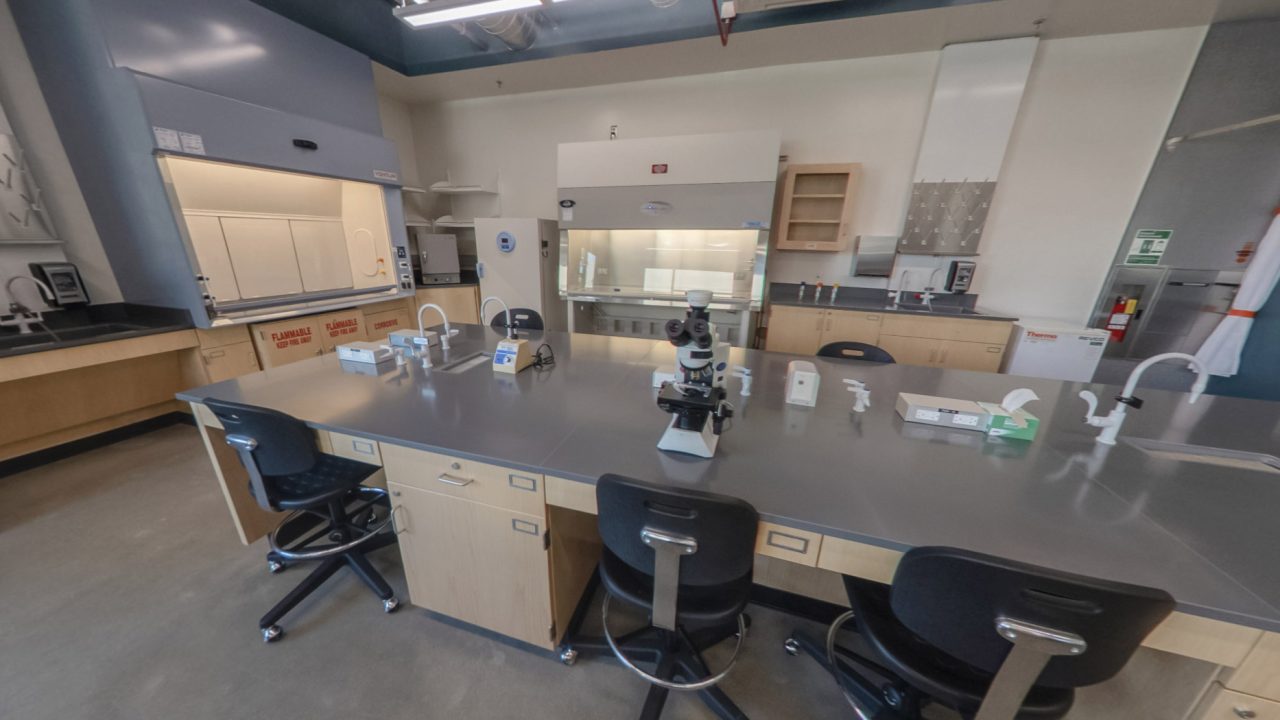Biology
Biologists study many aspects of how life operates — from the molecular details of cell function to how entire ecosystems function.
You’ll examine all aspects of the biological world, preparing you for multiple career paths, including the health professions, research, teaching and many others.
Explore advanced subjects in biology
Your first courses will give you a solid understanding of biological systems — covering everything from the molecular to the ecological level. With this foundational knowledge, you’ll be able to explore more advanced subjects, including:
- Marine biology
- Genetics
- Immunology
- Neuroscience
- Ecology
- Biochemistry
- Microbiology
- Physiology
Choose your preferred degree path
We offer two degrees in biology: a bachelor of science if you are considering a career in a health profession or research, and a bachelor of arts if your goal is to teach at the K-12 levels or pursue other post-graduate careers.
Get pre-med advising support
If you decide to pursue an advanced degree in medicine or allied health, you’ll have the help of our Pre-Med Advising Program to prepare for the challenges of graduate school.
At a Glance
Degree Type
Bachelor of Arts
Bachelor of Science
Department
Biology
School/College
College of Arts and Sciences
Next Steps
Interested in this major? Here's what you can do next:
With challenging and relevant courses, outstanding faculty, small class sizes, and an emphasis on hands-on learning, the biology program will position you to succeed in your chosen career.
Program Details
Find out what it takes to earn a degree in biology and explore the courses.
Highlighted Courses
Get familiar with some of the courses you might take in this major.
BIOL 325: Environmental Ecology
A study of ecology with emphasis on humans and the environment. Problems such as overpopulation, food production, water and air pollution, the energy crisis and toxic waste disposal are discussed; their possible solutions are considered along with the social, political and economic ramifications.
See descriptionBIOL 342: Developmental Biology
This advanced course affords students the opportunity to study the experimental basis underlying current understanding of animal development. Students read and present their analyses of seminal research papers in Developmental Biology, including classic examples as well as recent breakthrough publications.
See descriptionBIOL 343: Invertebrate Zoology
Studies the morphology, physiology, taxonomy and ecology of most invertebrate phyla. Field trips and laboratory observation of living animals are emphasized.
See descriptionBIOL 345: Marine Biology
The study of marine life of the world, with special emphasis on tidepool and shallow water life of the West Coast. Includes identification, distribution, adaptations of marine forms and their interrelationship to each other.
See descriptionBIOL 350: Introduction to Neuroscience
The course covers the structure and function of the nervous system with an emphasis on the mammalian nervous system. There are four main topic areas: the cellular organization of the nervous system; neuronal signaling; transduction and coding of sensory information; and the generation and coordination of motor output and behavior.
See descriptionBIOL 375: Cell Biology
The cellular nature of life is explored by studying prokaryotic and eukaryotic cells and their component parts at the structural and functional levels.
See descriptionRecommended Minors
Want to add even more value to your degree? Consider one of these minors to gain a unique combination of skills and perspectives.
Assistant Professor of Biology, Biochemistry Coordinator
Professor of Biology
Lecturer in the Biology Department
Assistant Professor of Biology
Professor of Biology and Environmental Science
Professor of Biology
Professor and Fletcher Jones Professor of Developmental Biology
Lecturer in the Department of Biology
Assistant Professor in the Department of Biology
Lecturer in Biology
Associate Professor of Biology
Check out the spaces and tools you'll have access to in this major. Explore the entire Cal Lutheran campus with our virtual tour
We offer hands-on opportunities that give you the freedom to explore your passion through real-world work and prepare for a fulfilling career.
-
Learning in Action
We emphasize “doing” science and an active approach to learning. Throughout your classes, you’ll gain a lot of research experience by working side-by-side with your professors in state-of-the-art facilities. You’ll design experiments, collect scientific data, perform statistical analysis and share your conclusions through research papers and presentations.
-
Conference Presentations
Many of our students have the opportunity to perform independent research with faculty advisors on campus and present their findings at research consortiums, such as our annual Festival of Scholars or off-campus conferences.
-
Research Opportunities
We offer numerous hands-on research experiences, including summer research fellowships. Students have also garnered recognition through California Heart Association grants, National Institutes of Health and National Science Foundation summer research posts, and internships at local biotechnology firms such as Amgen and Baxter — among the nation’s top biopharmaceutical corporations.
-
Student Clubs
Join our pre-health student clubs to connect with other students and faculty who share your passions and goals.
The American Medical Student Association is a club with a goal to foster the next generation of medical practitioners. This club provides students with the opportunity to participate in clinical and community volunteering. Furthermore and most importantly, this club offers the mentorship students need in order to pursue their careers within medicine.
-
Honors Society
To build additional experience, you can join our departmental honors program with additional research-intensive courses, or the TriBeta National Biological Honor Society.
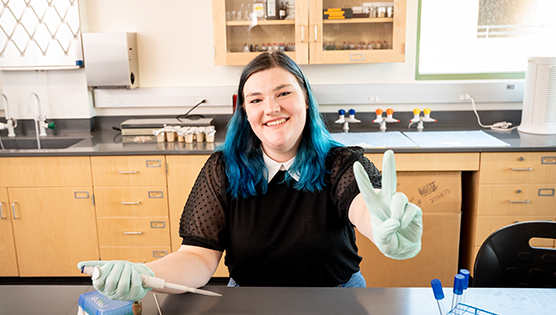
For me, as a person of faith and as a scientist, I see science as the means to more greatly understand the wonderful creation that God has made, and as a resource to ensure we care for it in the way humanity is called by God to do.
Jessica Easter '23
Biology Major
Our biology program can open up a number of career opportunities. The health professions, such as medicine, allied health, nursing, dentistry, or veterinary medicine, are popular with biology majors. You can also pursue a career in research, biotechnology, genetics, clinical work, pharmaceuticals, medical equipment and more. Many of our students are accepted into medical, dental, veterinary and other graduate schools.
Potential Careers
Medical and Clinical Laboratory Technologists
Perform complex medical laboratory tests for diagnosis, treatment, and prevention of disease. May train or supervise staff.
See descriptionCytogenetic Technologists
Analyze chromosomes or chromosome segments found in biological specimens, such as amniotic fluids, bone marrow, solid tumors, and blood to aid in the study, diagnosis, classification, or treatment of inherited or acquired genetic diseases. Conduct analyses through classical cytogenetic, fluorescent in situ hybridization (FISH) or array comparative genome hybridization (aCGH) techniques.
See descriptionPhysicians, Pathologists
Diagnose diseases and conduct lab tests using organs, body tissues, and fluids. Includes medical examiners.
See descriptionPhysician Assistants
Provide healthcare services typically performed by a physician, under the supervision of a physician. Conduct complete physicals, provide treatment, and counsel patients. May, in some cases, prescribe medication. Must graduate from an accredited educational program for physician assistants.
See descriptionForensic Science Technicians
Collect, identify, classify, and analyze physical evidence related to criminal investigations. Perform tests on weapons or substances, such as fiber, hair, and tissue to determine significance to investigation. May testify as expert witnesses on evidence or crime laboratory techniques. May serve as specialists in area of expertise, such as ballistics, fingerprinting, handwriting, or biochemistry.
See descriptionBiological Technicians
Assist biological and medical scientists. Set up, operate, and maintain laboratory instruments and equipment, monitor experiments, collect data and samples, make observations, and calculate and record results. May analyze organic substances, such as blood, food, and drugs.
See descriptionMicrobiologists
Investigate the growth, structure, development, and other characteristics of microscopic organisms, such as bacteria, algae, or fungi. Includes medical microbiologists who study the relationship between organisms and disease or the effects of antibiotics on microorganisms.
See descriptionMolecular and Cellular Biologists
Research and study cellular molecules and organelles to understand cell function and organization.
See descriptionLooking for more career paths? Search these related areas to discover more options.
Employers
Graduates from this major have gone to work at:
- Amgen
- Baxter Bioscience
- BioSource International
- CA Institute of Molecular Medicine
- Conejo Valley Veterinary Hospital
- DAKO, Inc.
- Federal Bureau of Investigation (FBI)
- Invitrogen
- Mobile Marine Lab
- Sea World
- Thermo-Fisher Scientific
- Ventura County Crime Lab
Graduate Schools
Our alumni have pursued advanced degrees at:
- Colorado State University
- Harvard University
- Johns Hopkins University
- Loma Linda University
- Marshall University
- Mayo Medical Clinic
- Midwestern University
- Southwest College of Naturopathic Medicine
- Tufts University
- UC, Davis
- UCLA
- University of Southern California
- Western School of Health Sciences

My research experience has been instrumental in shaping my professional conduct and reinforcing my commitment to achieving results. Through my research, I have learned to set achievable goals, prioritize my time effectively, and work efficiently to achieve my intended results.
Malik Hays '23
Biology Major
This page includes information from O*NET OnLine by the U.S. Department of Labor, Employment and Training Administration (USDOL/ETA). Used under the CC BY 4.0 license. Some occupations listed above may require a related graduate degree.
How We Prepare You for Success
We have 20,000+ employer contacts for jobs and internships, with over 200 listings posted each week.
Our excellent career counselors in the Career Services center will get in touch with you during your very first term on campus. They offer over 50 workshops each year on resume writing, interviewing, salary negotiations, applying to graduate schools, and other critical skills to help you begin your career successfully.
After you graduate from Cal Lutheran, you receive free access to Career Services for life, as a valued member of our alumni family.
of Cal Lutheran graduates find a job or enroll in graduate school within nine months
We work with students and families to make sure everyone who is admitted to Cal Lutheran can afford it.
Tuition & Fees
You and your family might have questions about how you’ll cover the costs of college. We can tell you this — it costs less than you think.
Scholarships & Grants
We offer a range of awards based on academic merit and financial need. This is money that does not need to be repaid.
Financial Aid
If you're new to the financial aid process, you probably have a lot of questions. But don't worry — we're here to help guide you all the way.
Let us know and we'll send you information about our academics, campus life, the admission process, and more!
Level Up Your College Search
Check out our college success guides to help you navigate the search process.

5 Tips for Applying to College
Learn how to look good when applying to colleges, with personal tips to stand out from Cal Lutheran admission counselors.

How to Afford College
Read this guide to minimize costs as you save for college during high school — learn all about scholarships, financial aid, FAFSA, and more!

How to Choose a College Major
Your major will be a significant part of your academic experience. How do you pick the right one?
